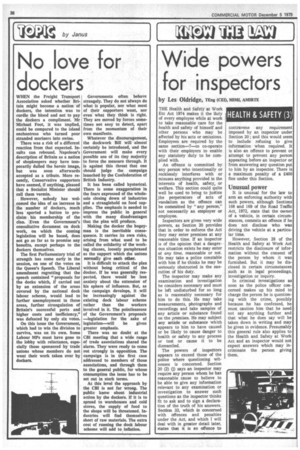Wide powers for inspectors
Page 40

If you've noticed an error in this article please click here to report it so we can fix it.
by Les Oldridge, TEng (CEI), MIMI, AMIRTE
HEALTH & SAFETY (3)
THE Health and Safety at Work Etc Act 1974 makes it the -duty
of every employee while at work to take reasonable care for the health and safety of himself and • other persons who may be affected by his acts or omissions.
Employees are required by the same section-7—to co-operate with their employers to enable any statutory duty to be complied with.
An offence is committed by any person who intentionally or recklessly interferes with or misuses anything provided in the interests of health, safety. or .welfare. This section could quite well be used to bring to justice the perpetrators of acts of vandalism as the offence can be committed by "any person," not necessarily an employer or employee.
Inspectors are given very wide powers, as Section 20 provides that in order to enforce the Act they may enter premises at any reasonable time. If an inspector is of the opinion that a dangerous situation exists he may enter at any time, reasonable or not. He may take a police constable with him if he thinks he may be seriously obstructed in the execution of his duty.
The 'inspector may make any examination and investigation he considers necessary and must be left undisturbed for so long as is reasonably necessary for him to do this. He may take measurements, photographs and recordings and take samples of any article or substance found on the premises. He may subject any article or substance which appears to him to have caused or be likely to cause danger to health or safety to any process or test or cause it to be dismantled.
The powers of inspeaors appears to exceed those of the police where questioning witnesses is concerned. Section 20 (2) (j) says an inspector may require any person whom he has reasonable cause to believe to be able to give any information relevant to any examination or investigation to answer such questions as the inspector thinks fit to ask and to sign a declaration of the truth of his answers. Sectlion 33, which is concerned with offences and penalties under the Act, and which I will deal with in greater detail later, states that it is an offence to contravene any requirement imposed by an inspector under Section 20; and this would seem to include refusing to give information when required. It is also an offence to prevent or attempt to prevent any person appearing before an inspector or from answering any question put to him by an inspector. There is a maximum penalty of a -£400 fine under this Section.
Unusual power
It is unusual for the law to arm an enforcing authority with such powers, although Sections 168 and 169 of the Road Traffic Act, 1972, state that the owner of a vehicle, in certain circumstances, commits an offence if he does not disclose who was driving the vehicle at a particular time.
However, Section 28 of the Health and Safety at Work Act restricts the disclosure of information without the consent of the person by whom it was furnished. But it may be disclosed in certain circumstances such as in legal proceedings, investigation or inquiry.
In criminal investigations as soon as the police officer concerned makes up his mind to charge the person he is questioning with the crime, possibly because he has confessed, he must caution him that he need not say anything further and that what he does say will be taken down in writing and may be given in evidence. Presumably this general rule also applies to the Health and Safety at Work Act and an inspector would not expect answers which may incriminate the person giving them.


































































































































